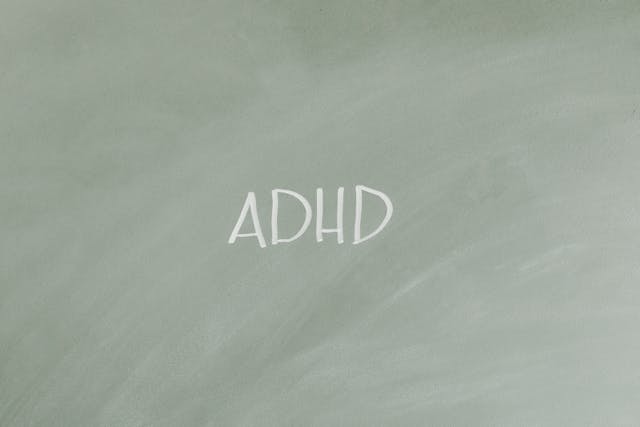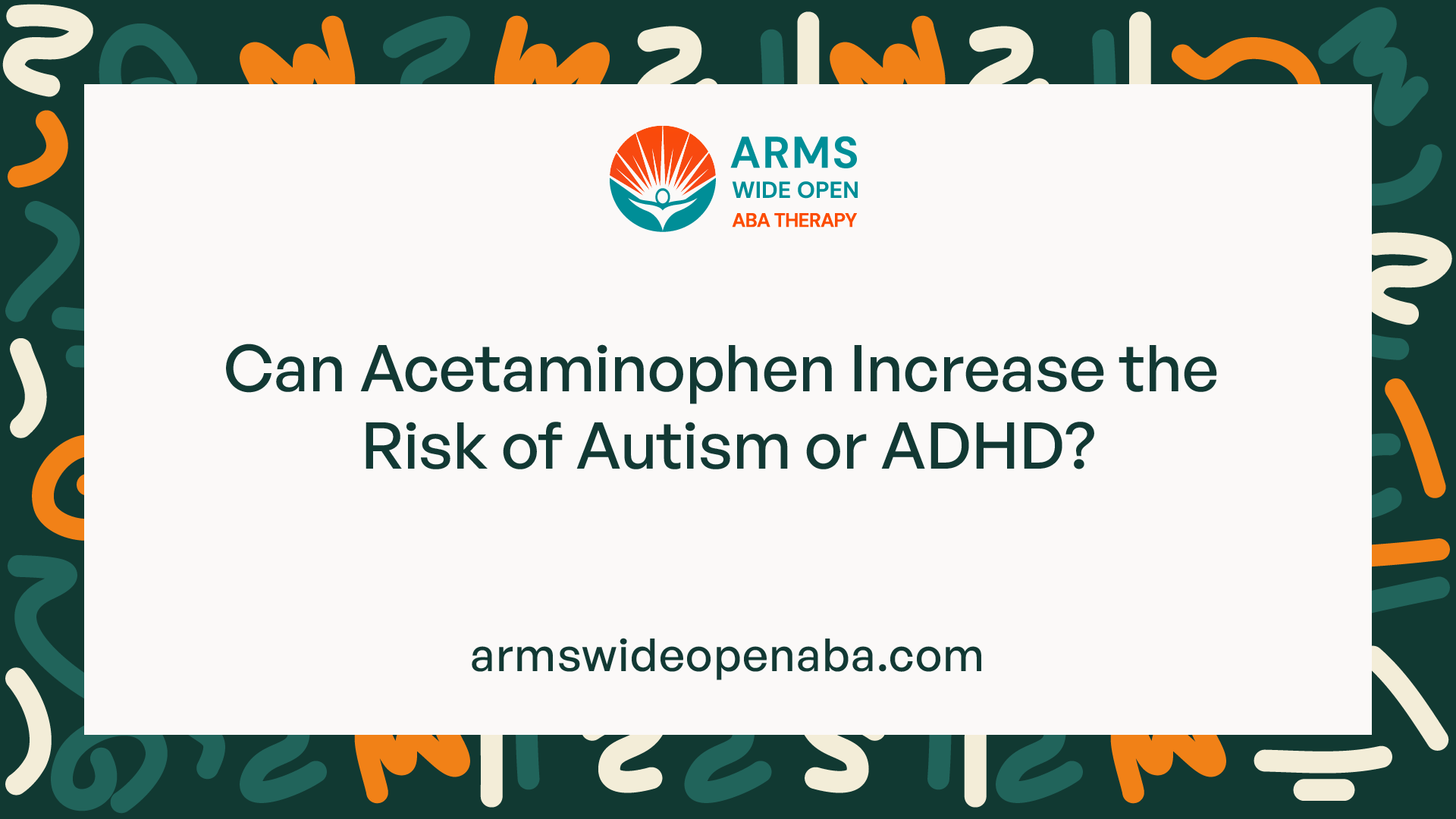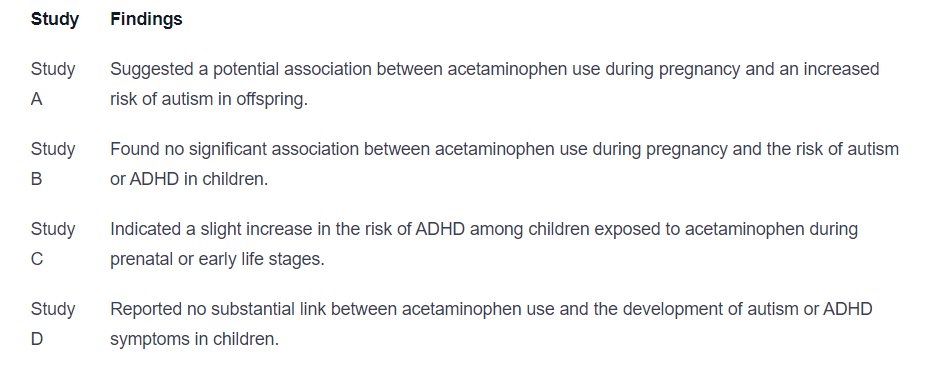Can Acetaminophen Increase the Risk of Autism or ADHD?
Unveiling the truth about acetaminophen's influence on autism or ADHD risk. Examining research, controversies, and responsible use.

Understanding Acetaminophen
Acetaminophen is a common medication that is widely used for its pain-relieving and fever-reducing properties. Understanding what acetaminophen is and its common uses is important for exploring its potential influence on the risk of autism or ADHD.

What is Acetaminophen?
Acetaminophen, also known as paracetamol, is a medication classified as an analgesic (pain reliever) and antipyretic (fever reducer). It is commonly used to alleviate mild to moderate pain and reduce fever. Acetaminophen works by inhibiting certain chemicals in the body that contribute to pain and fever.
Common Uses of Acetaminophen
Acetaminophen is widely available over-the-counter and is used for various purposes. Some common uses of acetaminophen include:
- Pain relief: Acetaminophen is commonly used to relieve pain caused by headaches, toothaches, muscle aches, and menstrual cramps.
- Fever reduction: Acetaminophen is effective in reducing fever associated with common illnesses such as colds, flu, and infections.
- Managing mild to moderate pain: Acetaminophen may be used to alleviate pain from conditions like arthritis, back pain, and minor injuries.
- Pediatric use: Acetaminophen is often used in children to alleviate pain and reduce fever. It is available in forms specifically designed for pediatric use.
- Combination products: Acetaminophen is also used as an ingredient in many combination medications, such as cold and flu remedies, to provide relief from multiple symptoms.
It's important to note that while acetaminophen is generally safe and effective when used as directed, it is essential to follow the recommended dosage guidelines and consult a healthcare professional if you have any concerns or questions.
Understanding the basics of acetaminophen sets the foundation for exploring the potential link between its use and the risk of autism or ADHD. In the following sections, we will delve into the research, controversies, and factors to consider regarding this topic.
The Link Between Acetaminophen and Autism/ADHD
In recent years, there has been speculation about a potential link between the use of acetaminophen (also known as paracetamol) and an increased risk of autism or ADHD (Attention Deficit Hyperactivity Disorder). Let's take a closer look at the research surrounding this topic.
Examining the Research
Numerous studies have been conducted to investigate the possible association between acetaminophen use and the development of autism or ADHD. However, it is important to note that the findings have been inconclusive and conflicting. While some studies suggest a potential link, others have found no significant evidence to support this claim.
To shed light on this matter, researchers have examined large populations, analyzed medical records, and conducted surveys to gather data. Despite these efforts, the results have been inconsistent, making it difficult to draw a definitive conclusion.
Correlation vs. Causation
It is crucial to understand the distinction between correlation and causation when discussing the link between acetaminophen and autism/ADHD. Correlation refers to a statistical relationship between two variables, whereas causation implies that one variable directly causes the other.
The studies conducted so far have primarily identified correlations, rather than establishing a cause-and-effect relationship. Correlation does not prove causation, as there may be other factors at play. It is essential to approach the findings with caution and consider other potential contributors to the development of autism or ADHD.
To better understand the impact of acetaminophen on autism and ADHD risk, more research is needed. Longitudinal studies, randomized controlled trials, and further investigation into underlying mechanisms are required to establish a clearer understanding of any potential associations.
While the research continues, it is important not to draw hasty conclusions or make decisions solely based on incomplete or conflicting findings. It is always advisable to consult with medical professionals and consider a holistic perspective when evaluating the risks and benefits of acetaminophen use.
By understanding the research and distinguishing between correlation and causation, we can approach the topic of acetaminophen and its potential influence on autism or ADHD risk with a critical mindset. As further studies emerge, a more comprehensive understanding of this complex relationship may be achieved.
Exploring the Controversy
The association between acetaminophen use and the risk of autism or ADHD has sparked much debate and controversy within the scientific community. Various studies have been conducted to investigate this potential link, but the findings have been conflicting, leading to ongoing discussions and debates.
Conflicting Studies and Findings
Different studies examining the relationship between acetaminophen and the risk of autism or ADHD have produced contradictory results. Some studies suggest a potential association, while others find no significant link. The conflicting findings make it challenging to establish a clear consensus on this matter.
To illustrate the disparity in results, here are examples of studies that have produced contrasting outcomes:

These conflicting results highlight the complexity of the issue and the need for further research to reach a more conclusive understanding.
Expert Opinions and Debates
Experts in the field of autism and ADHD research have expressed differing opinions on the potential link between acetaminophen use and the risk of these conditions. Some experts argue that the evidence is inconclusive and caution against drawing definitive conclusions based on the available studies. They emphasize the need for more rigorous research to establish a clear cause-and-effect relationship.
On the other hand, there are experts who believe that there may be a plausible biological mechanism that could explain the association. They suggest that acetaminophen's ability to reduce inflammation and affect neurotransmitter systems might contribute to the increased risk of autism or ADHD. However, further investigation is necessary to validate these hypotheses.
The ongoing debates among experts underscore the complexity of the topic and the need for continued scientific inquiry to shed more light on the potential relationship between acetaminophen use and the risk of autism or ADHD.
While the controversy persists, it is important to approach the topic with caution and consider the limitations of the available research. It is always advisable to consult with medical professionals and follow their guidance when making decisions regarding acetaminophen use. By staying informed about the latest research developments and engaging in informed discussions, we can contribute to a better understanding of this complex issue.
Factors to Consider
When evaluating the potential link between acetaminophen and the risk of autism or ADHD, it's important to consider various factors that can contribute to the overall picture. While research has explored this topic, it's essential to analyze these factors to gain a comprehensive understanding.
Dosage and Frequency of Acetaminophen Use
The dosage and frequency of acetaminophen use are crucial aspects to consider when examining its potential impact on autism or ADHD risk. Studies have investigated whether higher doses or prolonged use of acetaminophen may be associated with an increased risk. However, the available research is not conclusive, and further investigations are needed to establish a clear relationship.
To provide a reference, here is a table outlining the general recommended dosage of acetaminophen for adults:

It's important to note that these are general guidelines, and specific dosing recommendations may vary based on factors such as age, weight, and individual health conditions. Always consult with a healthcare professional or refer to the product label for appropriate dosing instructions.
Other Potential Risk Factors
When considering the relationship between acetaminophen use and the risk of autism or ADHD, it's essential to acknowledge that several other factors may contribute to these conditions. These factors can include genetic predisposition, prenatal exposures, environmental influences, and lifestyle choices. It's crucial to approach research in this area with caution, as isolating the impact of acetaminophen alone can be challenging due to the complex nature of these conditions.
Individual Variations and Genetic Factors
Individual variations and genetic factors play a significant role in understanding the potential impact of acetaminophen on autism or ADHD risk. Each person may have a unique genetic makeup that can influence how they respond to medications and environmental exposures. It is plausible that some individuals may be more susceptible to the effects of acetaminophen, while others may not be affected in the same way.
Understanding these individual variations and genetic factors is an ongoing area of research. Scientists are actively exploring genetic markers and other indicators that may help identify subpopulations that could be more vulnerable to potential risks associated with acetaminophen use.
By considering factors such as dosage and frequency of acetaminophen use, other potential risk factors, and individual variations and genetic factors, we can gain a more comprehensive understanding of the complex relationship between acetaminophen and the risk of autism or ADHD. It's important to approach this topic with an open mind, acknowledging the limitations of current research, and encouraging further investigation to provide more conclusive evidence.
Responsible Use of Acetaminophen
When it comes to the use of acetaminophen and its potential influence on the risk of autism or ADHD, responsible usage is of utmost importance. Here are some key considerations for the responsible use of acetaminophen.
Consultation with Medical Professionals
Before starting or altering any medication regimen, it is always advisable to consult with a qualified medical professional. They can provide personalized guidance based on your specific health needs and considerations. Medical professionals can help assess the risks and benefits of acetaminophen use, taking into account your medical history, current medications, and any pre-existing conditions. Open and honest communication with your healthcare provider is essential to make informed decisions about acetaminophen use.
Weighing the Benefits and Risks
When considering the use of any medication, it is crucial to weigh the potential benefits against the potential risks. Acetaminophen is a widely used over-the-counter medication known for its effectiveness in relieving pain and reducing fever. It is important to acknowledge that the potential link between acetaminophen and the risk of autism or ADHD is still a topic of ongoing research and debate. It's essential to consider the current scientific evidence, consult medical professionals, and make an informed decision based on your individual circumstances.
Promoting Overall Health and Well-being
While the potential link between acetaminophen and neurodevelopmental disorders continues to be explored, it is important to focus on promoting overall health and well-being. This includes adopting a healthy lifestyle, maintaining a balanced diet, engaging in regular physical activity, and managing stress levels. These factors contribute to general well-being and can positively impact overall health outcomes.
By taking a holistic approach to health, you can create an environment that supports the well-being of yourself and your loved ones. It's important to remember that responsible use of acetaminophen is just one aspect of maintaining overall health. Regular check-ups with medical professionals, adherence to recommended dosages, and being mindful of potential risk factors are all part of responsible acetaminophen use.
Remember, responsible use of medication, including acetaminophen, involves informed decision-making, open communication with healthcare professionals, and prioritizing overall health and well-being.
Sources
https://health.clevelandclinic.org/pregnancy-does-acetaminophen-heighten-risks-for-autism-adhd
https://hub.jhu.edu/2019/11/05/acetaminophen-pregnancy-autism-adhd/
https://www.spectrumnews.org/news/scientists-debate-evidence-linking-acetaminophen-to-autism-adhd/
Similar articles
We’re here to help you

Our team is here to assist you in this process. Contact us for any assistance.
it’s easy to apply
We Accept Most Insurances
Our in-network insurance partnerships make ABA therapy more accessible to families throughout our service areas.







Our Insurance Process
We'll request your insurance details to help us verify your plan's coverage for ABA therapy. Once we've received this information, we'll walk you through your benefits, including copayments, deductibles and out-of-pocket maximums, so you know what to expect in advance.
Our team will then handle the preauthorization and all the necessary paperwork.
.svg)





















.jpeg)


































.jpeg)




.jpeg)







.jpeg)











.jpeg)
















